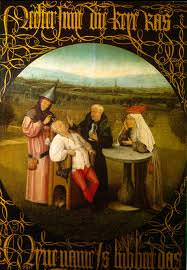Mental Disability and Intellectual Impairment in the Middle Ages: Some Preliminary Research Findings
Session: Mental Health in Non-medical Terms
Irina Metzler (Swansea University)
This is a brief summary of an interesting paper that was one of the four given in the Mental Health in Non-medical Terms session at KZOO. It looked at philosophy, iconography and the way mental disability was viewed in the Middle Ages.
Physical health in the Middle Ages has been studied however, intellectual disability has not been studied as in depth. Modern writers rarely look back beyond the nineteenth century mainly because the availability of records was more abundant after this time. One of the aims of Metzler’s research was to examine in depth what constituted intellectual disability in the Middle Ages. She explored the inherent problems with this line of study and asked: What are we looking at? What is intellectual disability?Do different cultures and societies have different markers for what constitutes intellectual disability? Is this a modern construct? She looked for examples of Downs Syndrome in early iconography – is this a modern discourse? Modern terminology is vast, changing and subject to medical trends. The terms have changed once or twice in subsequent generations, i.e., “Intellectual disability”, “mental defect”, “mental retardation”, “metal deficiency” etc… In medieval terms, a medieval “idiot” is not a modern “idiot”: salos, moriom insipens, fatuus, sot, silly, fool, simple etc… “Descriptions of madness in (medieval or modern) literature are misleading”.
Sources used in research of Mental Disability and Impairment
Philology
Philosophy
Medical descriptions
Legal and Administrative history
Imagery
Literary texts
Notable by their complete absence: hagiographic texts! Metzler has not found, to date, a single incidence of someone born a fool who is cured by miracle means by a saint. She skimmed through a couple of English legal history cases about idiocy, for example, a pardon given to “an idiot” for killing a man dressed as a pretend monster. He was deemed not responsible for his actions – a sort of “insanity defense”. Between 1172-1175 in the miracles of Thomas Becket there appeared to be the one piece of evidence of a person healed who is termed an “idiot” but it turned out not to be a physical impairment, but a job title – a Jester who is injured in the kitchen by slipping and the swelling is reduced by Thomas.
Metzler also touched on philosophers like John Blund (d. 1248) who wrote a tract on idiots. ‘The soul of an idiot is wiser than the soul of the philosopher’. This passage says devine lights permeates everything even the soul of an idiot, so there is no difference between people who are mentally impaired and a “normal” person, however, knowledge, unlike philosophy, is subject to intellectual differences.
Mental Disability and Intellectual Impairment in the Middle Ages: Some Preliminary Research Findings
Session: Mental Health in Non-medical Terms
Irina Metzler (Swansea University)
This is a brief summary of an interesting paper that was one of the four given in the Mental Health in Non-medical Terms session at KZOO. It looked at philosophy, iconography and the way mental disability was viewed in the Middle Ages.
Physical health in the Middle Ages has been studied however, intellectual disability has not been studied as in depth. Modern writers rarely look back beyond the nineteenth century mainly because the availability of records was more abundant after this time. One of the aims of Metzler’s research was to examine in depth what constituted intellectual disability in the Middle Ages. She explored the inherent problems with this line of study and asked: What are we looking at? What is intellectual disability? Do different cultures and societies have different markers for what constitutes intellectual disability? Is this a modern construct? She looked for examples of Downs Syndrome in early iconography – is this a modern discourse? Modern terminology is vast, changing and subject to medical trends. The terms have changed once or twice in subsequent generations, i.e., “Intellectual disability”, “mental defect”, “mental retardation”, “metal deficiency” etc… In medieval terms, a medieval “idiot” is not a modern “idiot”: salos, moriom insipens, fatuus, sot, silly, fool, simple etc… “Descriptions of madness in (medieval or modern) literature are misleading”.
Sources used in research of Mental Disability and Impairment
Philology Philosophy Medical descriptions Legal and Administrative history Imagery Literary textsNotable by their complete absence: hagiographic texts! Metzler has not found, to date, a single incidence of someone born a fool who is cured by miracle means by a saint. She skimmed through a couple of English legal history cases about idiocy, for example, a pardon given to “an idiot” for killing a man dressed as a pretend monster. He was deemed not responsible for his actions – a sort of “insanity defense”. Between 1172-1175 in the miracles of Thomas Becket there appeared to be the one piece of evidence of a person healed who is termed an “idiot” but it turned out not to be a physical impairment, but a job title – a Jester who is injured in the kitchen by slipping and the swelling is reduced by Thomas.
Metzler also touched on philosophers like John Blund (d. 1248) who wrote a tract on idiots. ‘The soul of an idiot is wiser than the soul of the philosopher’. This passage says devine lights permeates everything even the soul of an idiot, so there is no difference between people who are mentally impaired and a “normal” person, however, knowledge, unlike philosophy, is subject to intellectual differences.
~Sandra Alvarez
Subscribe to Medievalverse
Related Posts